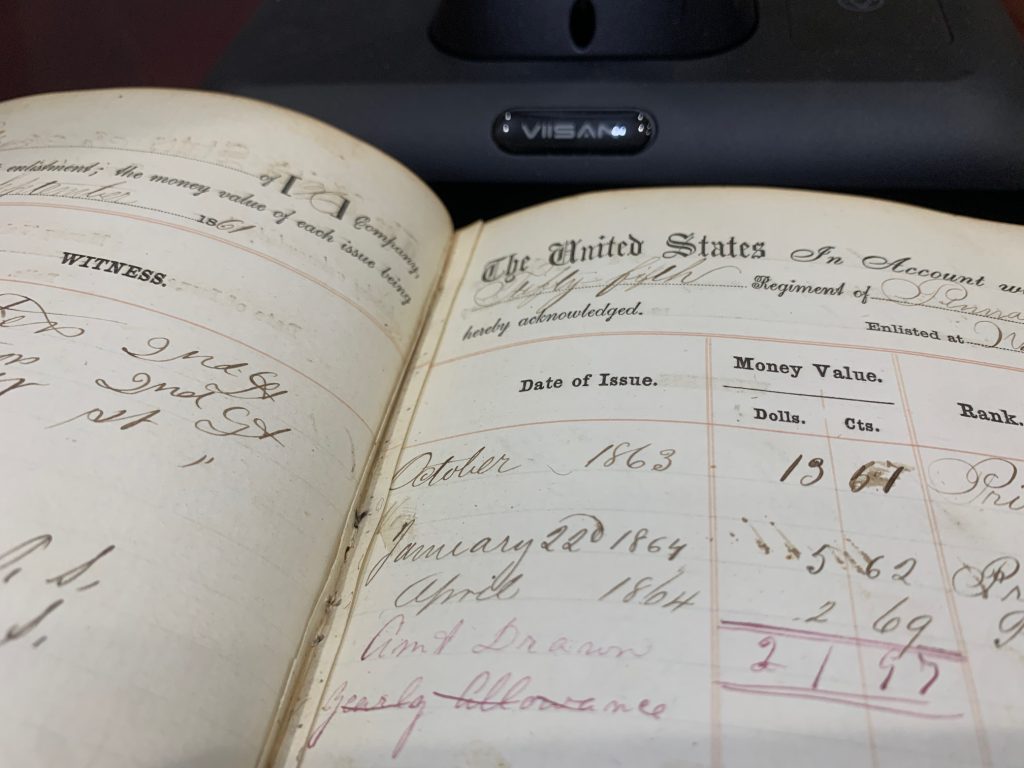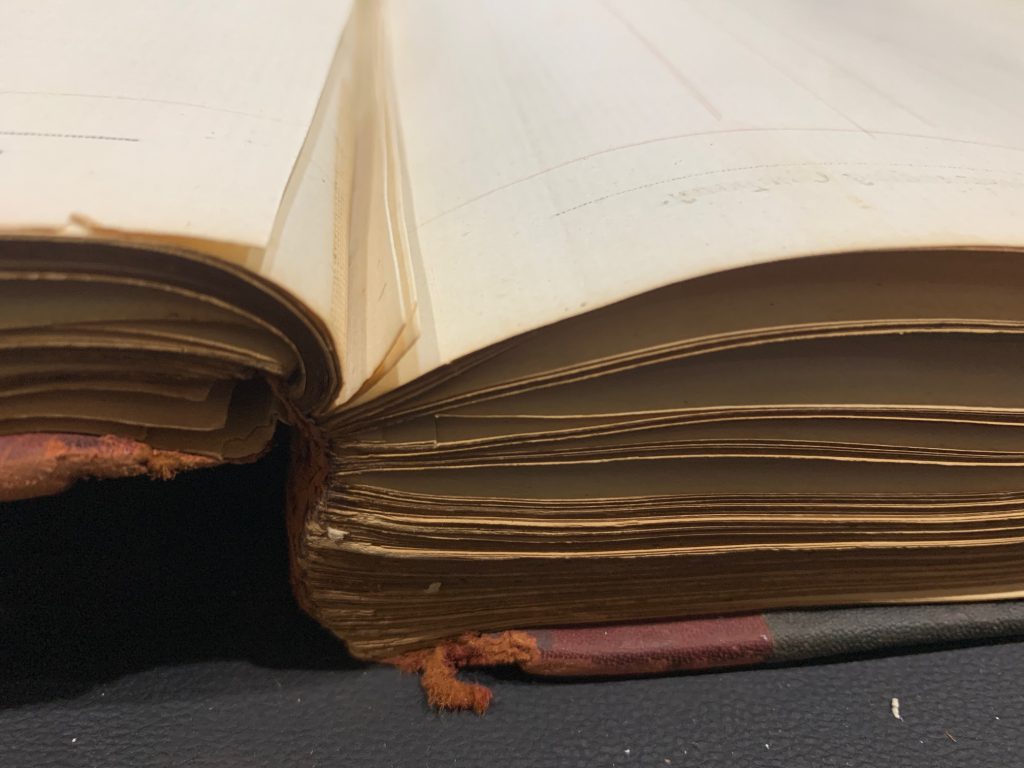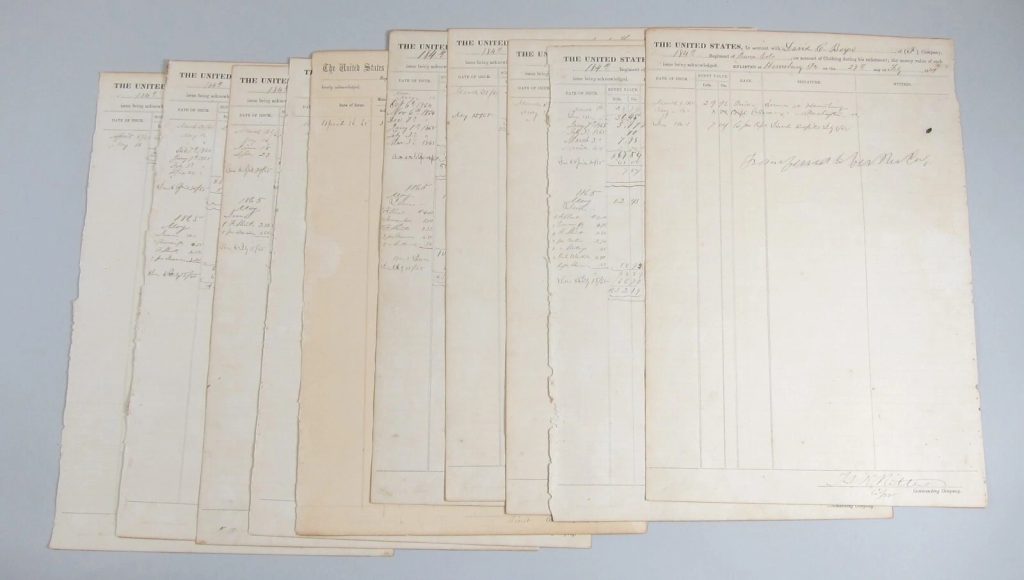Angry Archivist: Cutting Up History
Angry Archivist: Cutting Up History
Don’t you love it when you sit down to read through a historic book and someone has cut pages out of it? Isn’t that wonderful? No? I didn’t think so. Today, I’m going on a bit of a rant on our friendly neighborhood eBay sellers who pick up historic books and then dismantle them and sell them by the page. As you may have guessed, I’m not a fan. History is nothing without context and when people are cutting up history in order to try to maximize their profit, it’s a real problem.

Today’s example is a clothing ledger of the 55th Pennsylvania Infantry for companies H and I. Each page is dedicated to a specific soldier, and it seems the seller decided to cut out the ones that sounded interesting? I’m not really sure what the motivation was to just cut some out and not others. What makes this even more special is that this is a period Civil War handwritten ledger. This was not mass produced. In many cases, there is only a single copy surviving. And now it’s all dismantled and scattered to the wind. Thank you, random eBay seller. But at least you got, what? $20 a page? Nothing like destroying history for a cool $20.
I see this process of dismantling old books rampant in any antique books with illustrations, government books (Senate records, etc.), antique books with maps, etc. And if I’m being honest, no, I don’t care for that either, but at least in those cases there still tend to be many copies of those books lying around. It’s certainly not good and I don’t agree with it, but when it comes to handwritten Civil War ledgers of which there are likely only one or a few copies, it goes from being frustrating to flat out property destruction.
For historians, and for what we do at the Research Arsenal, context is everything with history. The story that goes with every object is what separates it from a random antique. Pickers and most online sellers tend to deal purely with antiques. They don’t care much about the stories (unless they drive up the price), they are just looking to flip merchandise for a profit. No shame in that, but when it comes to one of a kind historical artifacts that are being treated that way, I get upset. Using a far-fetched example, imagine Abraham Lincoln’s reading glasses have been safely tucked away with the descendants of a family friend. Imagine the significance those would have in a museum or an exhibit on Lincoln. Imagine what those would sell for on the open market? Now imagine you have a pair of antique reading glasses from around 1860, and you have no idea where they came from, who owned them, nothing. They become simply reading glasses from around 1860. The entire provenance is lost and therefore the history of them is lost. Now you can find them at the next antique show where their story is lost to history.

When you take a one-of-a-kind book and dismember it to sell it for parts, you are dismantling and destroying the value that book has as a complete book. The information that is lost when a book like this is torn apart is not easily recovered. What happens when Joe Smith buys the clothing records for ten soldiers of Company I of the 55th PA on eBay? Well, those records go to his house where they sit in a collection for who knows how long. Maybe they eventually wind up in a museum, a garage sale, an antique show, who can say. Meanwhile, a researcher now has the remainder of Company I and is missing these ten soldiers. How do you reunite that information? Even with the internet, it would be next to impossible.
If Joe Smith bought those records, digitized them, and made them available online (or at least made it known online that he has them) it would certainly help the situation. But at the end of the day, you’re still left with a dismembered book that somehow survived 160 intact until an eBay seller got ahold of it. And someone else has a stack of random pages (or a single page) from that same book.

And for the sellers out there, this may be shocking to you, but there are actually people would like to buy the entire book! You don’t have to wait for some distant relative of one of the soldiers listed in your book to come calling and buy the single page their great-great-great-grandfather is listed on! You could in fact, just sell the whole book! Obviously, the Research Arsenal would be interested in those sorts of records to add to the database, but you may even find local archives, universities, and museums that would be willing to purchase the entire book. Maybe try reaching out to them first, or even listing the entire book before you consider destroying it for a few bucks.
I know there are very well meaning and good hearted sellers out there who truly care about the history and this is not directed at them. There are, however, a number of sellers who are driven more by profit than respect for their history, and it’s a shame. If nothing else, please think twice before you do something irreversible and take historically significant books and destroy them by parceling them out in pieces. One that happens, it cannot be undone, and it’s a tremendous disservice to our nation’s history.
Like I’ve said before, when you come into possession of historic items and artifacts, you are not their owner. You are their caretaker. These items have existed since before you were born and if you do things right, they’ll continue to exist long after you’re gone. But, that’s the key, you have to do things right and take care of them. And unfortunately, I see some folks stumbling on that part of it.

